Numbers | Chapter 1 | 8th Maths - Properties of Rational Numbers | 8th Maths : Chapter 1 : Numbers
Chapter: 8th Maths : Chapter 1 : Numbers
Properties of Rational Numbers
Properties
of Rational Numbers
Some properties
listed here below will be of good use in solving problems.
1. Closure
property/law for the collection ℚ of rational numbers
i) Closure property for Addition
For any two
rational numbers a and b,
the sum a + b is also a rational number.
ii) Closure property for Multiplication
For any two
rational numbers a and b,
the product ab is also a rational number.
Illustration
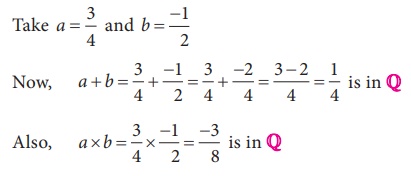
Try this
The closure property on integers holds for subtraction and not for
division. What about rational numbers? Verify.
Solution:
Let 0 and 1/2 be two rational numbers 0 – 1/2 is a rational
number
∴ Closure property for subtraction holds for rational numbers.
But consider the two rational number 5/2 and 0.
5/2 ÷ 0 = 5 / [2 × 0] = 5
/ 0
Here denominator = 0 and it is not a rational number.
∴ Closure property is not true for division of rational numbers.
2. Commutative
property/law for the collection ℚ of rational numbers
i) Commutative property for Addition
For any two
rational numbers a and b,
a + b = b + a.
ii) Commutative property for Multiplication
For any two
rational numbers a and b,
ab = ba (ab means a ×
b and ba means b ×
a).
Illustration
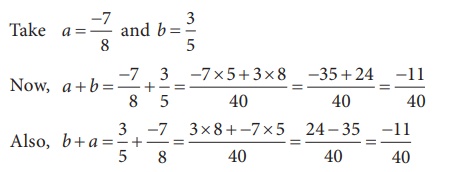
Here, we find that a + b = b + a and hence addition is commutative.
Further,
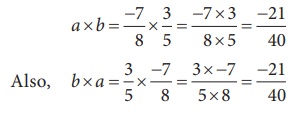
Here, we
find that a ×
b = b
×
a and hence multiplication is commutative
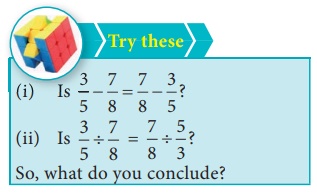
Solution:
Is 3/5 – 7/8 = 7/8 – 3/5 ?
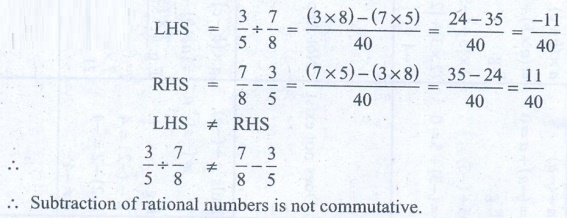
LHS = 3/5 + 7/8 = [ (3 × 8) – (7 × 5) ] / 40 = [24 – 35] / 40 = −11/40
RHS = 7/8 − 3/5 = [ (7 × 5) – (3 × 8) ] / 40 = [35 – 24] / 40 =
11/40
LHS ≠ RHS
∴ 3/5 ÷ 7/8 ≠ 7/8 – 3/5
∴ Subtraction of rational numbers is not commutative.
(ii) Is 3/5 ÷ 7/8 = 7/8 – 5/3 ?
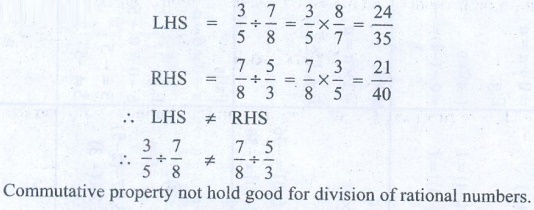
LHS = 3/5 ÷ 7/8 = 3/5 × 8/7 = 24/35
RHS = 7/8 ÷ 5/3 = 7/8 × 3/5 = 21/40
∴ LHS ≠ RHS
∴ 3/5 ÷ 7/8 ≠ 7/8 ÷ 5/3
∴ Commutative property not hold good for division of rational
numbers.
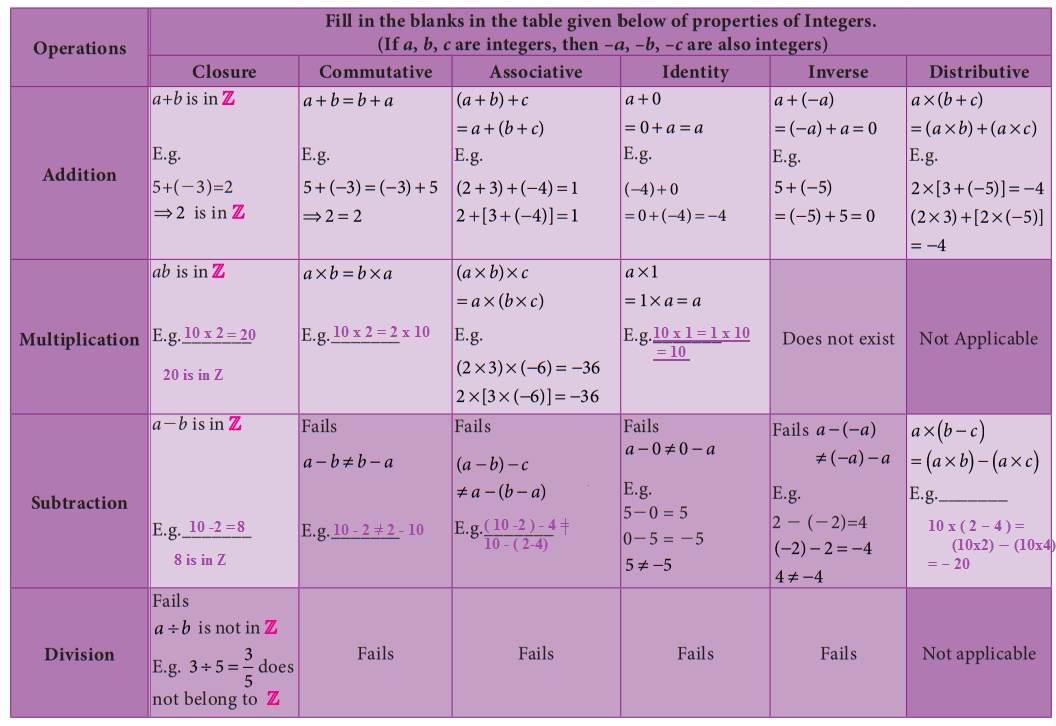
3.
Associative property/law for the collection ℚ of
rational numbers
i) Associative property for Addition
For any three
rational numbers a, b,
and c, a + (b + c) = (a
+ b) + c
ii) Associative property for Multiplication
For any three
rational numbers a, b,
and c, a(bc) = (ab)c
Illustration
Take rational
numbers a , b, c as a = −1/2 , b = 3/5 and c =
−7/10
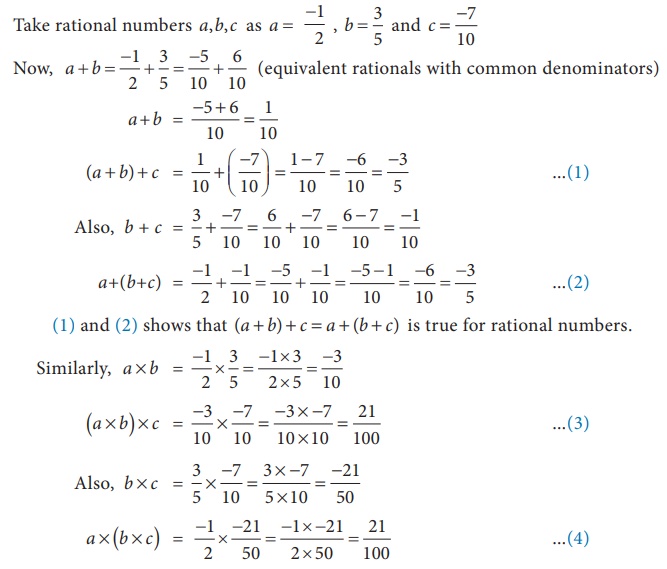
(3) and (4) shows that
(a ×
b) × c
=
a × (b × c) is true for rational
numbers. Thus, the associative property is true for addition and multiplication
of rational numbers.
Try this
Check whether associative
property holds for subtraction and division.
Solution:
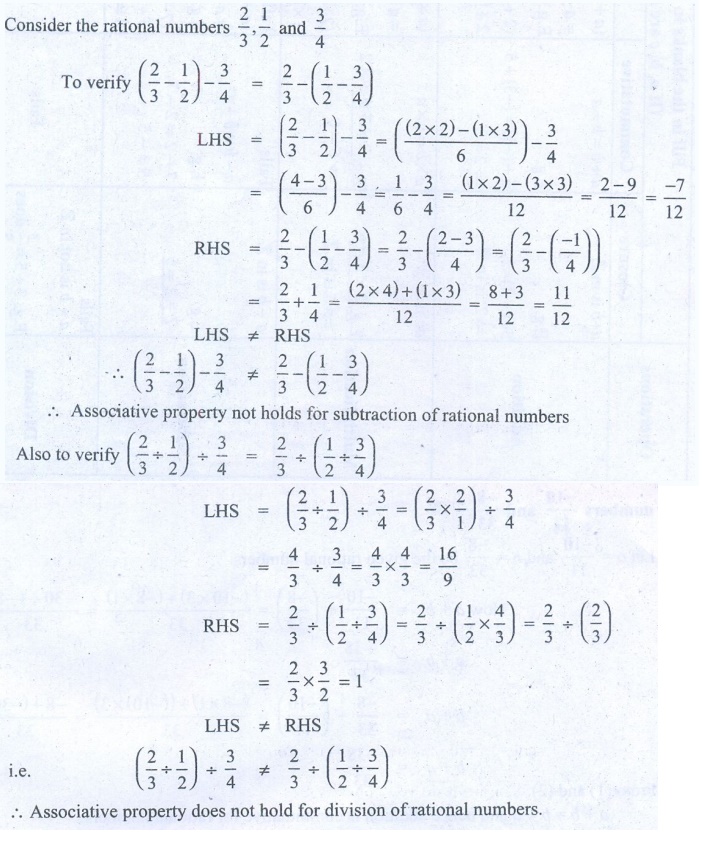
Consider the rational numbers 2/3, 1/2 and 3/4
To verify (2/3 – 1/2) – 3/4 = 2/3 – (1/2 – 3/4)
LHS = (2/3 – 1/2) – 3/4 = ( [(2 × 2) – (1 × 3)] / 6 ) – (3/4)
= ([4 – 3]/6) – 3/4 = 1/6 – 3/4 = [(1 × 2) – (3 × 3)] / 12 = [2
– 9] / 12 = – 7 / 12
RHS = 2/3 – (1/2 – 3/4) = 2/3 – ( [2 – 3] / 4) = ( 2/3 − (−1/4) )
= 2/3 + 1/4 = [ (2 × 4) +
( 1 × 3) ] / 12 = [ 8 + 3] / 12 = 11 / 12
LHS ≠ RHS
∴ ( 2/3 – 1/2) – 3/4 ≠ 2/3 − (1/2 − 3/4)
∴ Associative property not holds for subtraction of rational
numbers
Also to verify (2/3 ÷ 1/2) ÷ 3/4 = 2/3 ÷ (1/2 ÷ 3/4)
LHS = (2/3 ÷ 1/2) ÷
3/4 = (2/3 × 2/1) ÷ 3/4
= 4/3 ÷ 3/4 = 4/3 × 4/3 =
16 / 9
RHS = 2/3 ÷ (1/2 ÷ 3/4) = 2/3 ÷ ( 1/2 × 4/3) = 2/3 ÷
( 2/3 )
= 2/3 × 3/2 = 1
LHS ≠ RHS
ie. (2/3 ÷ 1/2) ÷ 3/4 ≠ 2/3 ÷ ( 1/2 ÷ 3/4)
∴ Associative property does not hold for division of rational
numbers.
4. Identity
property/law for the collection ℚ of rational numbers
i) Identity property for Addition
For any rational
number a, there exists a unique rational number 0 such that
0 + a = a = 0 + a.
ii) Identity property for Multiplication
For any rational
number a, there exists a unique rational number 1 such that
1 × a = a = a × 1.
Illustration
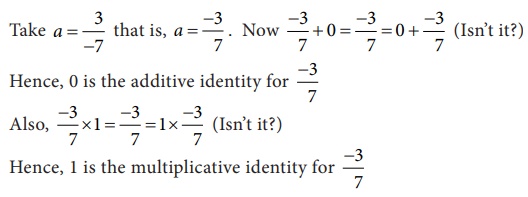
Take a = 3/-7 that is, a = -3/7 . Now -3/7 + 0 = -3/7 = 0 + -3/7 (Isn’t it?)
Hence, 0
is the additive identity for −3/7
Also, -3/7
× 1 = - 3/7 = 1 × -3/7 (Isn’t it?)
Hence, 1
is the multiplicative identity for −3/7
5. Inverse
property/law for the collection ℚ of rational numbers
i) Additive Inverse property
For any rational
number a, there exists a unique rational number –a
such that a + (–a)
= (–a) + a = 0. Here, 0 is the additive identity.
ii) Multiplicative Inverse property
For any rational
number b, there exists a unique rational number 1/b such that b × 1/ b = 1/b × b =
1 . Here, 1 is the multiplicative identity.
Illustration
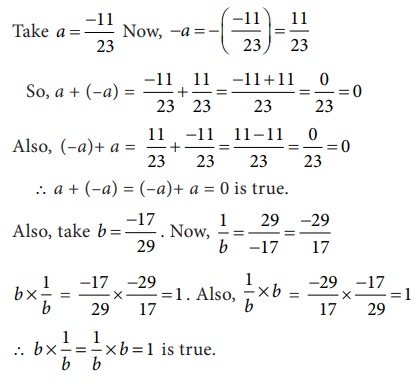
6. Distributive
property/law for the collection ℚ of rational numbers
Multiplication
is distributive over addition for the collection of rational numbers. For any three
rational numbers a, b
and c, the distributive law is a × (b +c) = (
a × b) +(a × c)
Illustration
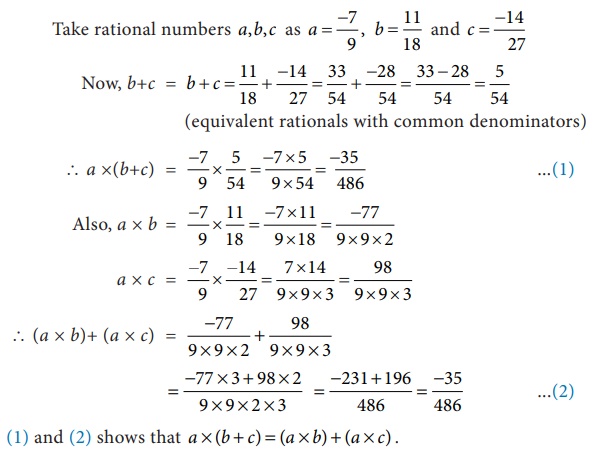
(1) and (2)
shows that a ×
(b + c
) =
(a × b)
+
(a × c)
.
Hence, multiplication is distributive over addition for the collection ℚ of rational numbers.
Related Topics